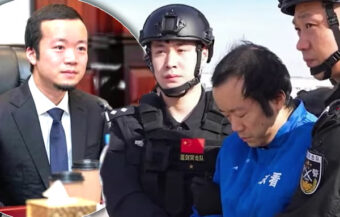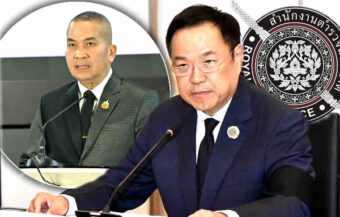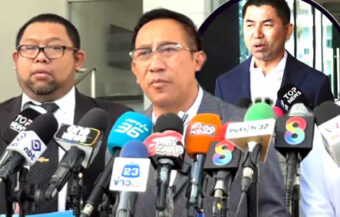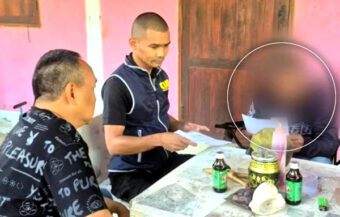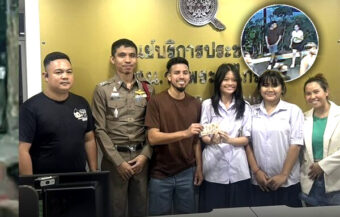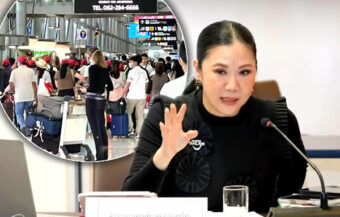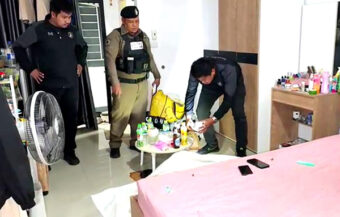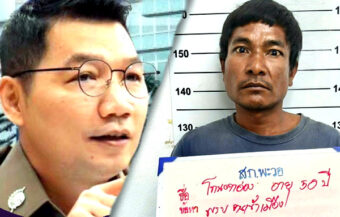People’s Party meeting ends in chaos, leaving 32nd Prime Ministerial vote in limbo. Pheu Thai blindsided it with a late formal approach. Bhumjaithai’s 283-vote claim is rejected, while senior members and MPs remain divided over backing candidates or abstaining.
Monday’s People’s Party meeting imploded on Monday, leaving Thailand’s 32nd Prime Minister vote in chaos. Pheu Thai’s push and formal approach for Chaikasem Nitisiri appears to have blindsided the nation’s largest opposition party. Bhumjaithai leader Anutin Charnvirakul’s claim of 243 votes was shot down, though doubts linger over any informal decisions. Some senior MPs pushed to abstain, others proposed backing both candidates and letting parliamentary dealmaking play out. The party’s indecision exposes deep internal fractures at a critical political moment.
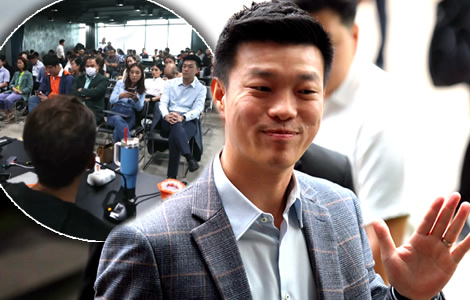
A meeting at the People’s Party headquarters in Bangkok on Monday evening ended without a clear decision, raising more questions than answers. MPs and key party executives attended the session, which was led by party leader Nattapong Ruangpanyawut. Debate was intense, particularly over whether the Pheu Thai Party or the Bhumjaithai Party could be trusted to lead an interim government if supported by the People’s Party.
The Pheu Thai Party had over the weekend put forward a proposal to the People’s Party leadership, a move that reportedly caught them off guard. Party sources insisted no formal deal or commitment had been made with the Bhumjaithai Party or its leader, Anutin Charnvirakul.
Nonetheless, following the removal of former Prime Minister Paetongtarn Shinawatra by the Constitutional Court on Friday, Mr. Anutin claimed the support of 283 MPs for his party’s nomination. Notably, the Bhumjaithai Party holds 68 seats in parliament.
Anutin claims multiple party support to swing the premiership while People’s Party hesitates
In addition, Mr. Anutin secured backing from the Kla Tham Party, which holds 25 MPs, and five crossbenchers or cobras from the Pheu Thai Party. Support also came from six MPs from the Thai Sang Thai Party and from the Palang Pracharat Party, led by former coup-maker General Prawit Wongsuwan.
Anutin on Friday insisted he could muster 283 votes to swing the premiership. Yet, if the People’s Party backed Pheu Thai nominee Chaikasem Nitisiri, that candidate could potentially receive even more votes.
The Pheu Thai Party continues to enjoy support from the Prachachat Party and several MPs within the Democrat Party, in addition to other coalition parties for now. Certainly, in the next few days, all this could shift dramatically.
However, it remains unclear presently which way Thailand’s oldest party, the Democrats, will vote. Monday’s meeting was heated, with many discussing the Bhumjaithai Party’s record.
Members scrutinise Bhumjaithai and Pheu Thai over governance, coup links and constitutional reform
Members debated their potential support for a party that was an integral part of the 2019-2023 government, aligned with the 2014 coup d’état. In addition, its blocking of constitutional reform initiatives over the last two years was widely noted.
Allegations against the party’s top leadership, currently under investigation, related to the 2024 Senate election and the Khao Kradong land scandal, were also examined.
The Pheu Thai Party’s recent performance in government came under sharp scrutiny as well.
Critics targeted the role of the Shinawatra family, particularly the controversy over the June 15 audio clip with Hun Sen. In it, former Prime Minister Paetongtarn appeared overly accommodating and spoke in a partisan manner about a respected army officer.
After the tape surfaced on June 18, the People’s Party called for the immediate dissolution of parliament and Ms. Paetongtarn’s resignation. That position remains unchanged.
Now, with Ms. Paetongtarn removed and Mr. Anutin pursuing the premiership, questions have arisen over whether the Pheu Thai Party can still dissolve parliament. Dr. Prinya Thaewanarumitkul, a law lecturer at Thammasat University, addressed the issue on Monday.
Acting Prime Minister’s legal and ethical authority questioned as Thailand faces political uncertainty
He distinguished between whether acting Prime Minister Phumtham Wechayachai could legally request the King to sign such an order, and whether doing so would be ethical or justified.
Experts warn that political tensions made such a move risky, especially when there was a viable alternative for the premiership and, more importantly, while a contentious vote was still in play.
Meanwhile, the gaps and inconsistencies in the 2017 Constitution were again highlighted.
At the meeting, some attendees cited Pheu Thai’s July 2023 support for Pita Limjaroenrat’s nomination as Prime Minister. This occurred despite the ruling party later breaking a memorandum of understanding with the Move Forward Party, the People’s Party’s predecessor.
Political analysts particularly noted the depth of antagonism within the People’s Party toward the Shinawatra family and Pheu Thai.
This stance contrasts with opinion polls showing 65% public support for a Pheu Thai–People’s Party alliance. Historically, support between these two parties has been linked.
People’s Party calls again for parliament dissolution amid leadership turmoil and uncertain strategy
Monday evening, the People’s Party issued a statement again calling on Pheu Thai and acting Prime Minister Phumtham to dissolve parliament. Legal analysts widely considered such a move unwise, warning it could plunge Thailand into deeper political chaos.
The statement suggested that if the call was ignored, the People’s Party would use its 143 votes to elect a new Prime Minister. Undeniably, this development is likely to unsettle Pheu Thai and indicate a pre-existing course having already been decided, even informally.
Nonetheless, minutes before the statement, the party had sent an SMS opinion poll to members, gathering feedback on the leadership decision.
Clearly, the People’s Party has displayed uncertainty and inexperience when entrusted with substantial political power. One option floated on Monday was for the party to refrain from supporting either Mr. Anutin or Chaikasem Nitisiri.
Another was to support both candidates, leaving the ultimate outcome to negotiations among other political parties. Both approaches reflected continuing indecision.
People’s Party emerges as kingmaker amid ethical controversies and rising coalition uncertainty
The People’s Party, Thailand’s largest opposition party, controls nearly a third of parliamentary seats. This positions it as a potential kingmaker in breaking the deadlock caused by Ms. Paetongtarn’s dismissal for an ethics violation. On Monday, party lawmakers weighed whether to support Pheu Thai or Bhumjaithai.
The latter had quit the governing coalition in June and is mounting its own challenge. “There was a wide exchange of views today, and the party will convene again tomorrow,” said spokesperson Parit Wacharasindhu. “To be straight, we don’t trust either,” he added, referencing both parties’ adherence to demands for a referendum and parliament dissolution.
Ms. Paetongtarn, 39, became the sixth Shinawatra-backed premier removed by military or judicial intervention over two decades. She is the second to be ousted in a single year.
The Pheu Thai Party, founded by her father Thaksin Shinawatra, faces a steep challenge rebuilding its coalition after losing public support. This shift opened the door for dealmaking by Bhumjaithai and its ambitious leader, Mr. Anutin.
Parliament plans a special session starting Wednesday, with the secretary-general indicating a potential vote on a new Prime Minister if parties are ready. No time limit exists for forming a government, leaving ample room for strategic manoeuvring.
Political deadlock worsens amid economic weakness and rivalry between old and new party forces in politics
The fluid political environment, coupled with histories of betrayal and significant war chests, raises the likelihood of allegiance shifts and parliamentary deadlock. This comes at a time of weak economic growth, further challenging Southeast Asia’s second-largest economy.
The spotlight remains on the People’s Party, a reincarnation of the Move Forward Party, which won the 2023 election on an anti-establishment platform. Lawmakers allied with the conservative right blocked its access to power in July that year.
Significantly, the Pheu Thai Party at that time supported the Move Forward Party’s efforts to form a government, though it was blocked by a junta-era, selected Senate.
Both Bhumjaithai and Pheu Thai leaders have held meetings with the People’s Party, affirming readiness to meet its demands. Acting Prime Minister Phumtham stated on Sunday, “We are in a political crisis, and there is a need to find a common solution.”
The People’s Party remains divided, with another meeting scheduled for Tuesday. Party members Natthaphong Ruangpanyawut and top MPs insisted there is no secret deal to withdraw a lawsuit against 44 People’s Party MPs. These MPs face the very real prospects of being removed and blocked from politics by another Constitutional Court ruling under the 2017 charter.
MPs debate guidelines and prepare for a vote amid mixed opinions and absent members in their constituencies
On September 1, during the meeting led by Mr. Natthaphong, MPs and executive committee members debated voting guidelines for the Prime Ministerial vote. Opinions varied on whether to back candidates from Pheu Thai or Bhumjaithai, or to vote for neither.
Members agreed that no deal existed to withdraw lawsuits in exchange for votes. The meeting, held on the 7th floor of the Future Forward Party building, saw many but not all of the party’s 143 MPs attend. Notably, some remained in other provinces, tending to constituency duties. A source confirmed that all MPs would be present for the next meeting on September 2.
After the meeting, reporters sought statements from arriving MPs. Karoonpol Tiansuwan, a party-list MP, said it was too early to assess trends in the prime ministerial vote. He asked MPs to leave their concerns in a group chat for further executive committee discussion.
A conclusion is expected on Tuesday, he said, when the party will conduct an internal vote. Chutiphong Phiphobpinyo, Rayong MP, stated local public opinion is mixed, as citizens tire of frequent elections. He also denied any link between support for Bhumjaithai and the case involving 44 NACC MPs. The party discussed only the dissolution of parliament, he added.
Public hearing hears diverse opinions, while Bhumjaithai faces serious, unresolved corruption allegations
Bangkok MPs Thirachai Phanthumas and Natcha Boonchaiinsawat described Monday’s meeting as reflecting diverse opinions. They emphasised it was a public hearing, and no division existed. The next weekly party meeting is expected to provide a final conclusion.
Bangkok MP Rakchanok Srinok confirmed no agreements had been made and that the party leader had simply listened to MPs’ perspectives. She dismissed rumours about votes being exchanged to drop lawsuits and clarified that three points were communicated to the public.
Discussions also covered the Khao Kradong land scandal and corruption allegations linked to the 2024 Senate election. These are still unproven charges presently levelled against the Bhumjaithai Party’s leadership.
Dr. Prinya Thaewanarumitkul explained that the constitution does not prohibit the acting Prime Minister from dissolving parliament. However, such action should not occur during the election of a new Prime Minister.
Constitution provides legal path for dissolution, but appropriateness remains politically sensitive
The 2017 Constitution allows the King to dissolve parliament via Royal Decree under Section 103. Section 175 confirms that the Cabinet, led by the Prime Minister, submits royal decrees. Section 182 specifies that royal commands concerning state affairs must be countersigned by a minister. This includes the acting Prime Minister.
Therefore, the acting Prime Minister has legal authority to request a dissolution, but appropriateness is a political, not constitutional, matter.
Dr. Prinya emphasised that the House should not dissolve during the election of a new Prime Minister. Only if parliament fails to elect a new leader should a dissolution occur. Academics debate what can be done versus what should be done. Of course, it all illustrates the complexity of Thailand’s 2017 Constitution, which has many gaping legal holes.
Strong case for Chaikasem Nitisiri to lead an interim government tasked with Constitutional change
Deputy Minister of the Interior and Democrat Party Secretary-general vows not to support Anutin as PM
Pheu Thai and the People’s Party to talk about an Orange Red alliance to elect Chaikasem Nitisiri as PM
Government on brink of collapse as Bhumjaithai withdraws from Paetongtarn’s cabinet over clip
The People’s Party then sought input from its membership via Line OA and SMS questionnaires. These asked whether the party should direct its votes to dissolve parliament and pursue a referendum, or remain silent. Verified members were also asked which party’s candidate, Pheu Thai or Bhumjaithai, the party should support for Prime Minister.
As the political deadlock continues, the People’s Party is at the centre of Thailand’s turbulent parliamentary chessboard. With rival parties manoeuvring, public opinion divided and constitutional questions unresolved, the next 48 hours are expected to be tumultuous. Thailand is struggling to deal with its latest political crisis.
Join the Thai News forum, follow Thai Examiner on Facebook here
Receive all our stories as they come out on Telegram here
Follow Thai Examiner here
Further reading:
Strong case for Chaikasem Nitisiri to lead an interim government tasked with Constitutional change
Pheu Thai rattled by PM’s ouster. Risks complacently assuming the Premiership of Chaikasem Nitisiri
PM Paetongtarn Shinawatra ousted by Constitutional Court, collapsing Thai government over audio clip





